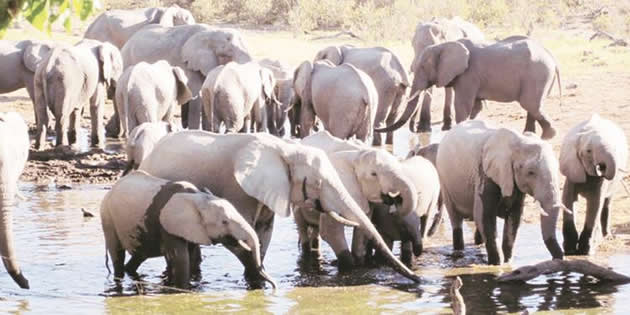Jumbo sales justified, says Kasukuwere


Zimbabwe’s elephant population has surged to around 54 000 against a carrying capacity of 15 000, posing a threat to the environment. -(File photo)
Zvamaida Murwira Senior Reporter
Government has defended the sale of elephants to lessen pressure on resources following the surge in the mammal’s population to around 54 000 against a carrying capacity of 15 000.
Environment, Water and Climate Minister Saviour Kasukuwere said on Tuesday that various zoos in the developed world, including the United States, were holding a significant number of African wildlife including endangered species like rhinoceros from Zimbabwe.
Minister Kasukuwere was responding to a parliamentary portfolio committee report on Environment, Water, Climate, Tourism and Hospitality Industry after a familiarisation tour of Hwange National Park early this month.
The committee had raised concern, saying people’s lives and crops in the area were in danger from elephants and other wildlife that were sharing the ecosystem such as water with animals.
He said the wildlife sector faced several challenges of poor cash flow and debt overhang, elephant population management dynamics, poaching, low tourist arrivals and trade restrictions.
“Out of the various options that are available to manage the elephants, Zimbabwe has currently opted for non-lethal methods such as capture and relocation including live sales and exports,” said Minister Kasukuwere.
“Despite the misplaced concerns about animal rights and welfare issues, Zimbabwe will continue capturing and translocating live animals to approved, appropriate and acceptable destinations within and outside the country in terms of laid down CITES procedures.”
Minister Kasukuwere said the surge in elephant population resulted in habitat degradation and affected biodiversity.
“This is creating serious ecological, financial and socio-economic challenges to the Zimbabwe Parks and Wildlife Management Authority,” he said.
“For instance, local overpopulation of elephants has resulted in competition between the elephants and other species in the parks, especially for browse and water during the dry season.
“On the other hand, elephants come into direct conflict with inhabitants of adjacent rural local communities as they destroy vegetation, crops, infrastructure and even kill people under various circumstances.”
Minister Kasukuwere said there was little engagement of communities by rural district councils as partners in wildlife resources management in communal areas, thereby leading to loss of both revenue and biodiversity due to subsistence and commercial poaching.
“RDCs are not always transparent and accountable to ward and village levels in terms of the breakdown of revenues from trophy hunting, lack of auditing,” he said.
“Non-adherence to revenue sharing guidelines by most RDCs cannot only be attributed to the difficult economic situation in the country, but also the absence of a legal mechanism that entitles communities to financial benefits from wildlife resources.”







Comments